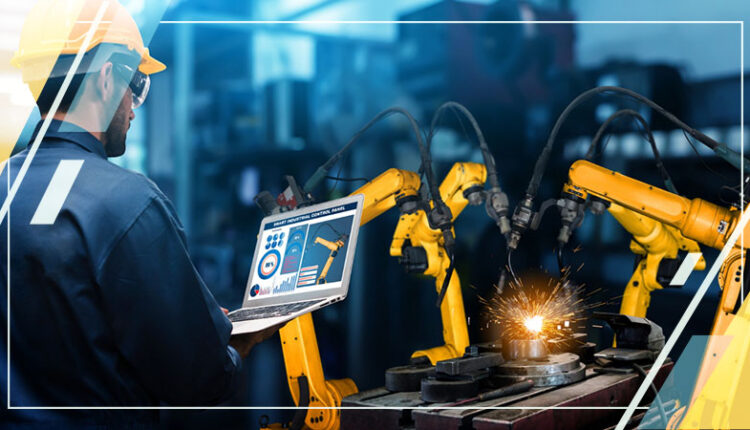Have you ever envisioned a world where machines seamlessly orchestrate complex tasks, enhancing productivity and efficiency across industries? Enter industrial automation, where advanced technologies are redefining the landscape of manufacturing, efficiency, and productivity. From smart factories to robotic assembly lines, this blog embarks on a journey through the intricate web of industrial automation, unraveling the types, benefits, and future trajectory of a paradigm shift that promises to reshape the way we conceive and conduct industrial processes.
Let’s get started!
What is Industrial Automation?
Industrial automation encompasses the utilization of a range of technologies, including computer software, robotics, control systems, and information technologies, to regulate machinery and processes across different industries. Its primary objective is to substitute or augment human participation in carrying out specific tasks, specifically within the realms of manufacturing, quality assurance, material handling, and industrial processes.
Benefits of Industrial Automation
Industrial automation offers numerous benefits that manufacturers, OEMs, and industrial operations can utilize to enhance operational efficiency. Some of these advantages include:
● Improve Worker Safety
Industrial automation offers a solution to liberate workers from monotonous, hazardous, and unclean tasks. By implementing automation technologies, the risks of injuries caused by repetitive movements and heavy lifting can be minimized, resulting in a safer work atmosphere. This initial advantage not only improves the daily experience of workers but also allows them to devote their time to more intricate responsibilities.
● Increase Productivity
It can help minimize production slowdowns by using automated devices and unified platforms for proactive issue identification and resolution. Predictive maintenance, supported by data integration, reduces downtime and performance problems, allowing timely adjustments before bottlenecks occur.
● Higher Quality
Connected automation devices provide improved repeatability, enhanced fidelity, and the ability to collect data from various points in a production line, offering notifications to authorized individuals. Detecting quality deviations at an early stage can lead to production improvement, waste reduction, decreased rework, and increased profitability. Moreover, automation devices equipped with quality verification and validation capabilities enhance transparency and guarantee that manufactured parts meet customer specifications before being dispatched from the factory.
● Better Decision Making
Industrial automation integrates devices, enabling precise modeling, revenue identification, and stakeholder relationship improvement. It facilitates remote monitoring, streamlining operations, and enabling data-driven decision-making for managers.
Types of Industrial Automation Systems
When considering industrial automation, it is crucial to have a clear understanding of the various types of technologies involved, from basic conveyor belts to sophisticated AI and machine learning systems. Let’s have a quick look at its major types.
1. Fixed Automation
Fixed automation, also known as hard automation, is characterized by specific tasks, consistent workflow, large-scale production, and significant entry barriers. This type of industrial automation typically undergoes minimal changes. Introducing a new product or making alterations to the production process involves considerable expenses and time. In contrast, programmable industrial automation is more suitable for scenarios involving lower production volumes or shorter product life cycles, as it offers greater advantages.
2. Programmable Automation
Programmable automation, which is commonly linked with batch production, proves to be effective for manufacturing a considerable number of units, ranging from several dozens to thousands. This type of production often necessitates frequent changeovers, which are taken into account when determining batch sizes and lead times. Nevertheless, there is a growing emphasis on maximizing uptime and enhancing production output, prompting companies to embrace more adaptable forms of automation.
3. Flexible Automation
As industrial automation continues to advance, there is a noticeable decrease in human involvement and downtime, accompanied by an expansion in the variety of products manufactured by a single machine or production line. Flexible automation, exemplified by the utilization of accurate electromechanical controls such as CNC machines, facilitates automated changeovers, minimizing downtime. This approach is particularly beneficial for batch production as it enables more efficient and customized production to meet increasing demands.
4. Integrated Automation
Connecting devices and machines through a unified control system enhances manufacturing by fostering flexibility and customization. In the age of IIoT and Industry 4.0, real-time monitoring becomes pivotal, guiding production decisions for optimal results in industrial automation.
Must-Know: Top 3 Industrial Automation Companies in 2024
1. Advanced Integration Technology
The organization caters to the aerospace and defense sectors by providing automation technology utilized in factory-based manufacturing and assembly processes. Their offerings encompass automated systems designed for part-to-part assembly, as well as positioning systems and circumferential drillers that ensure accurate placement and alignment of components along the manufacturing line.
2. Rockwell Automation
The company specializes in creating and implementing automation technology across various industries. They provide tailored solutions such as maximizing yield in protein processing lines using robotic precision to enhance the accuracy of meat slicing. Additionally, they offer industrial automation for newspaper printing presses, aiming to enhance printing quality and efficiency.
3. ABB
The company has expertise in the field of electrification and automation engineering. They are dedicated to developing robotics and automation solutions for factories and machines that are applicable in various industries. Their primary emphasis is on adaptable manufacturing and intelligent machinery, which they promote as “the future factory.” The company’s Distributed Control Systems are designed to enhance industrial facilities by digitizing and automating operations, ensuring minimal waste and efficient energy consumption. Additionally, ABB industrial robots, exceeding a count of 300,000 units, are actively employed worldwide.
Bottom Line
Industrial automation stands as the cornerstone of a transformative era, empowering businesses to optimize operations, enhance precision, and foster innovation. As industries increasingly embrace this technology, the future promises heightened efficiency, improved decision-making, and a dynamic landscape where automation propels success across diverse sectors. The journey into industrial automation signifies not just a shift in operations but a leap toward a more interconnected, streamlined, and resilient industrial landscape.


